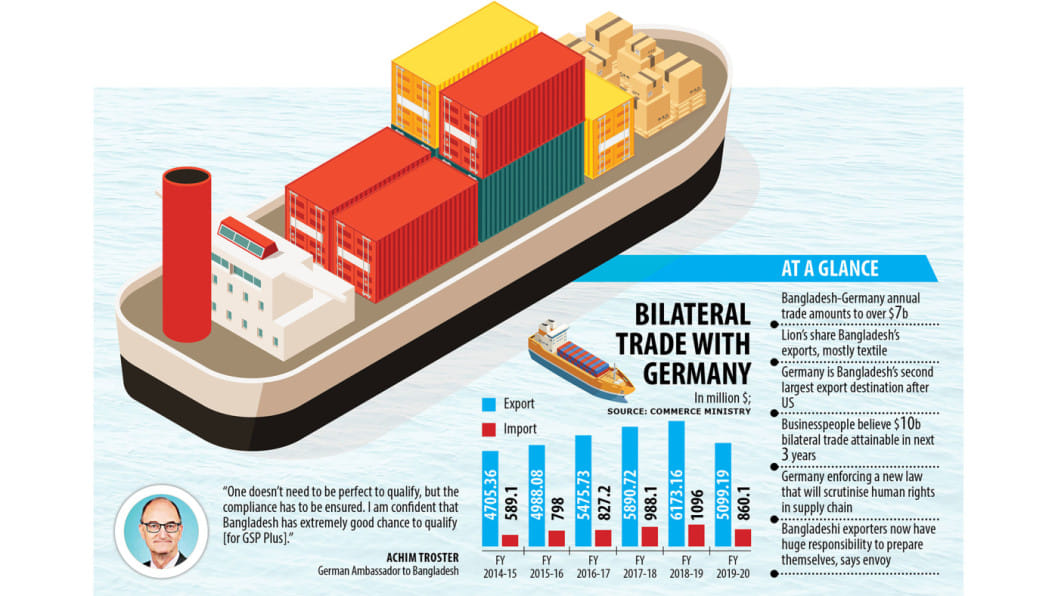Prepare for German human rights law for supply chains

German Ambassador to Bangladesh Achim Troster has advised Bangladeshi companies to prepare for challenges that may arise from 2023 when a German law comes into effect for enhanced human rights protection in supply chains.
The new act on corporate due diligence in supply chain will mandate German companies to ensure that no human rights violations take place in their own business operations and supply chains.
"Therefore, Bangladeshi exports, supplying to German companies, now have huge responsibilities to prepare themselves, especially in light of adoption of this supply chain law," he said.
Troster was addressing 50th anniversary celebrations of diplomatic relations between Bangladesh and Germany organised by the Bangladesh-German Chamber of Commerce and Industry (BGCCI) at the Radisson hotel in Dhaka on Sunday evening.
He also spoke about future challenges for Bangladesh turning ineligible for the Generalised Scheme of Preferences (GSP) once it makes the United Nations status graduation to a developing country in 2026. The European Union has provided a three-year grace period for the duty free market access.
The EU will then offer GSP Plus, another preferential trade facility, but that comes with conditions for ensuring labour rights, good governance, protection of the environment and human rights etc.
"One doesn't need to be perfect to qualify, but the compliance has to be ensured. I am confident that Bangladesh has an extremely good chance to qualify (for GSP Plus)," Troster said.
He said Bangladesh has progressed much in terms of infrastructure development and there has been political stability altogether, accelerating economic growth. These create new opportunities for strengthening bilateral cooperation, he said.
Trade between Bangladesh and Germany amounts to over $7 billion, with Germany importing over $6 billion worth products, mostly textile. It is Bangladesh's second largest export market after the US.
The German envoy also spoke of the need for Bangladesh to harness new export opportunities.
Bangladeshi businesspeople said there was potential for the trade volume to reach $10 billion in the next three years but stronger cooperation was required from both ends.
Metropolitan Chamber of Commerce and Industry President Saiful Islam said Germany was a leader in renewable energy and eco-friendly industries and could help Bangladesh, whose contribution in global carbon emissions was 0.4 per cent but was a major victim of climate change.
Also, the UN status graduation would translate to constraints in market access and concessional loans. Therefore, developed countries should share affordable green technologies, he said at the event moderated by BGCCI Executive Adviser and CEO Shahed Akhtar.
Incepta Pharmaceuticals Chairman and Managing Director Abdul Muktadir said German engineers have been making significant contributions to skills transfers to Bangladesh in the pharmaceutical sector.
He said his company, however, faces challenges in importing spare parts as it has to do it either from Singapore or India. It would be of much advantage if German companies have their outlets in Bangladesh. He sought the German embassy's support towards this end.
Bangladesh Ambassador to Germany Mosharraf Hossain Bhuiyan, who joined the event online, said he was in talks with German car manufacturers BMW and Mercedes who were eager to set up assembling plants in Bangladesh.
Foreign Minister AK Abdul Momen in a message read out by the ministry Director General (West Europe and EU) Faiyaz Murshid Kazi said the bilateral relations have reached a strategic depth, which would grow further in the coming days.
He sought Germany's help in improving technical skills of Bangladeshi workers and their recruitment in Germany.

 For all latest news, follow The Daily Star's Google News channel.
For all latest news, follow The Daily Star's Google News channel. 



Comments